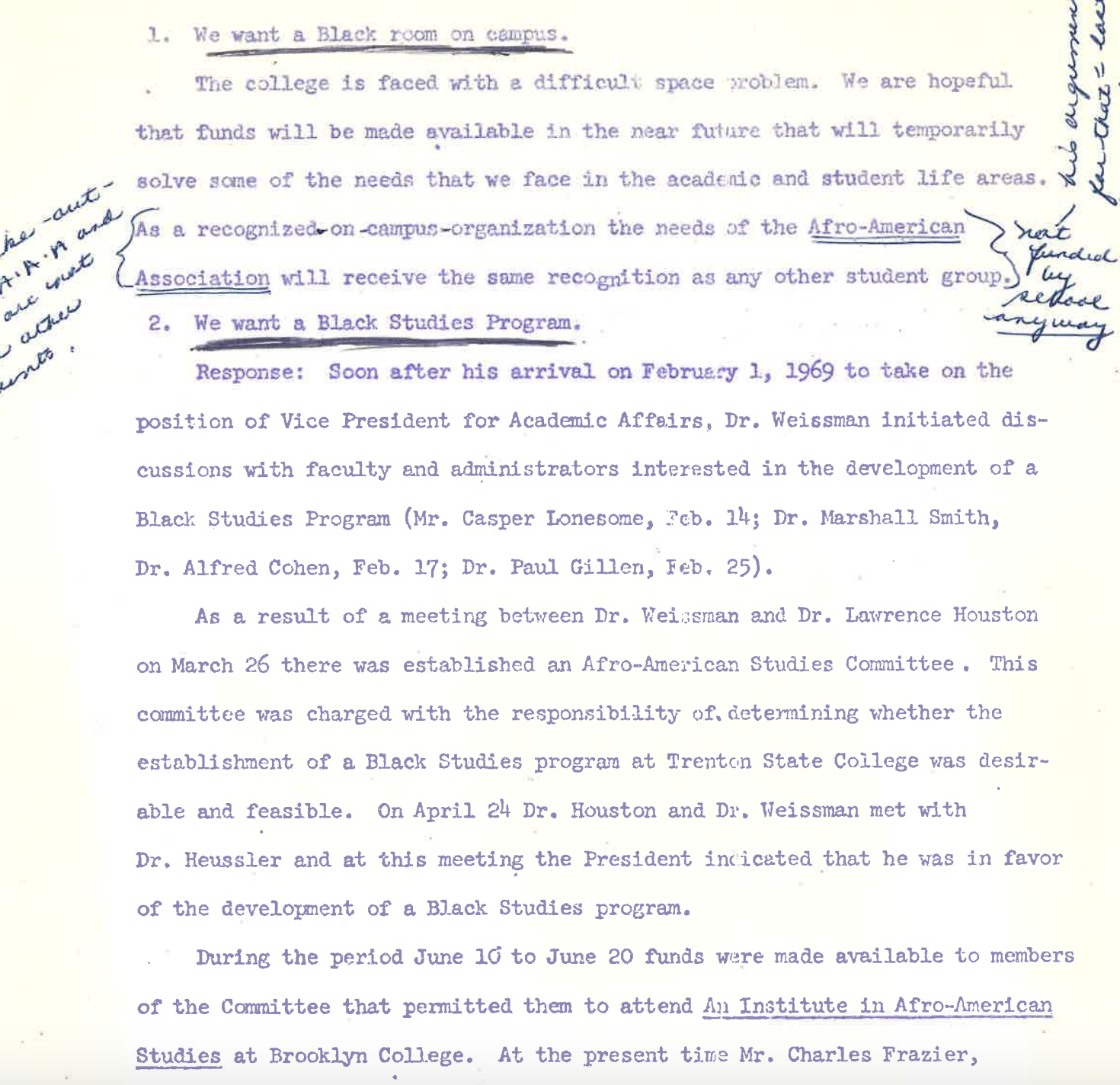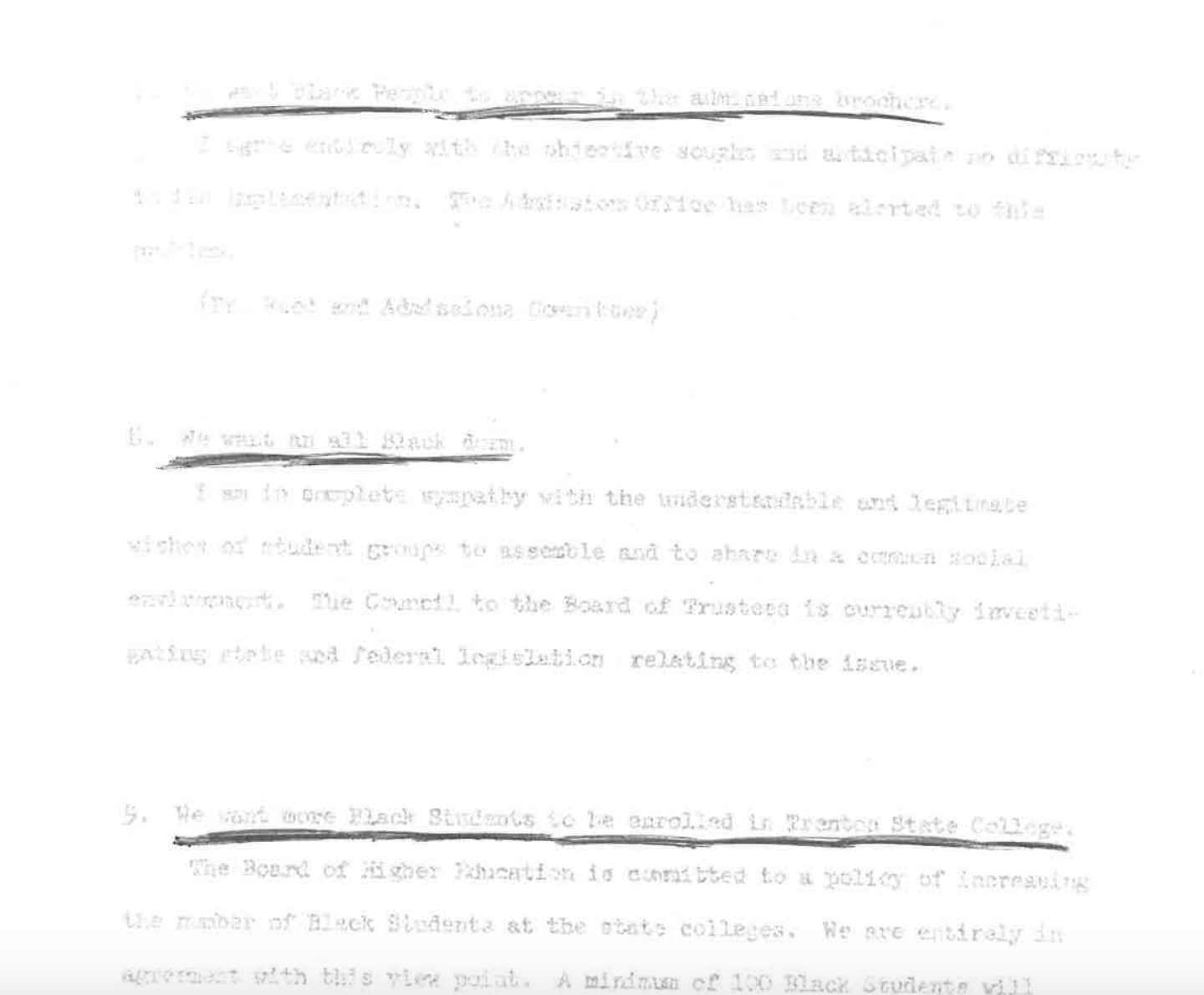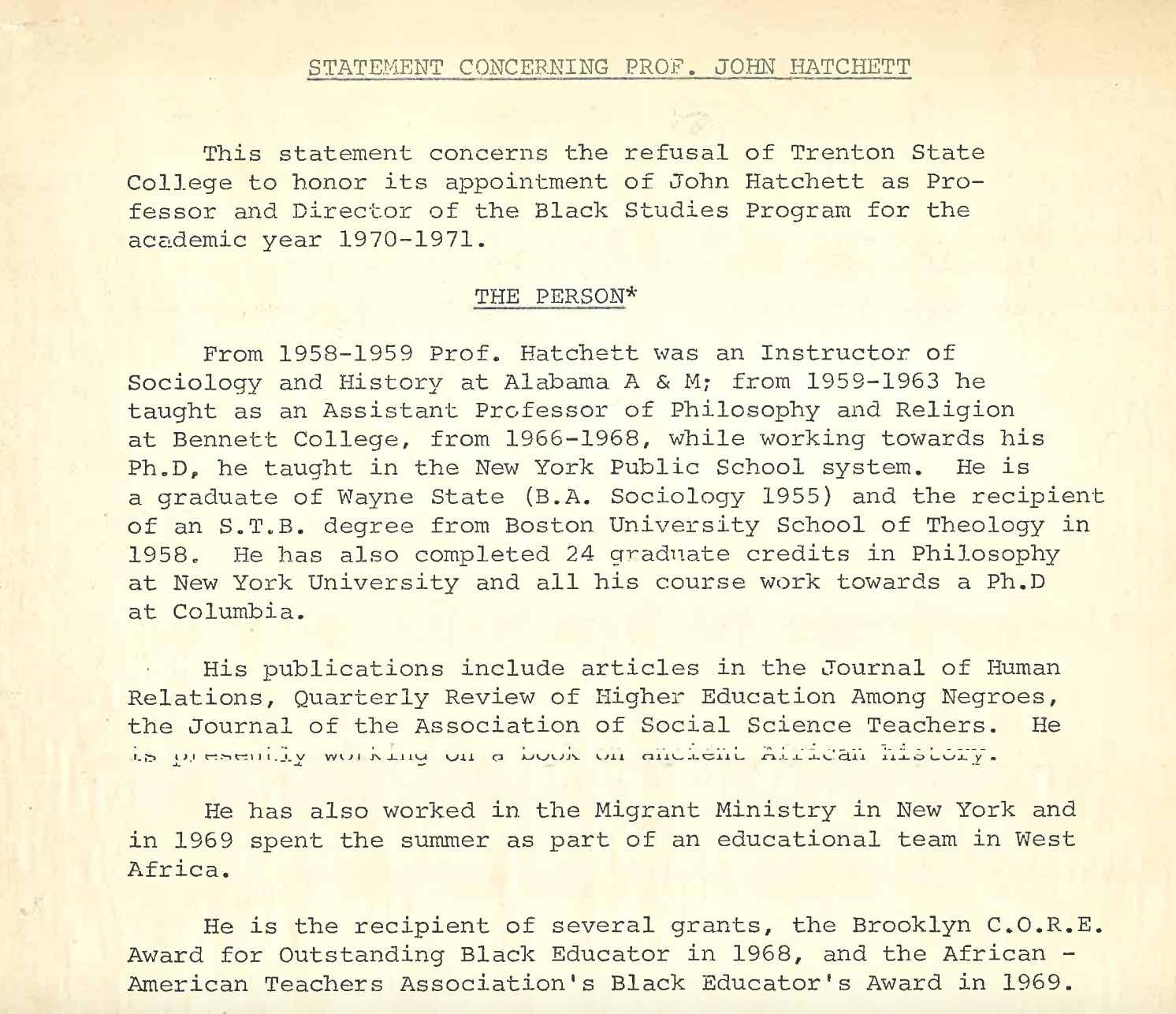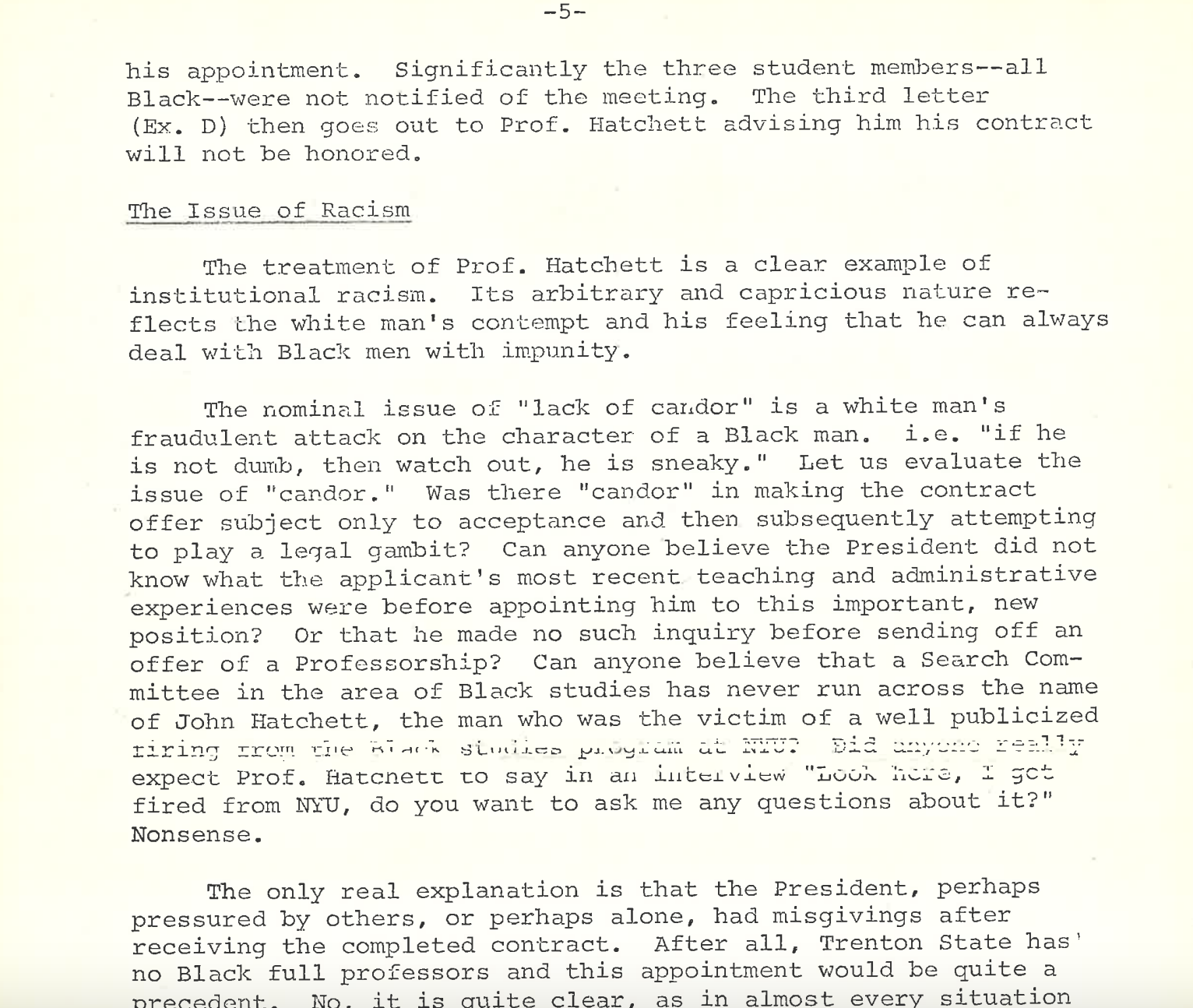The History of the Establishment of the TCNJ African-American Studies Department
By Ben Gallanter
Dr. Christopher Fisher, a professor of history at The College of New Jersey and the former chair of the African-American Studies department at the college, was able to become immersed with knowledge of the department’s history of establishment during his years as chair and as an enlightened historian involving this topic of TCNJ. Mr. James Chambers, a former student of TCNJ during the time period of the AAS department’s establishment, was able to receive a profound knowledge of the events that occurred during his time as a student that allowed the department to be founded at the college. Through an in-depth and insightful oral history interview with Dr. Fisher and a vast number of recovered archival documents involving important events that led to the department’s establishment from James Chambers, the historical events and moments that shaped the history of the department’s establishment begins to display itself.
During the oral history interview with Dr. Fisher, he discussed some of the crucial aspects and events of the history of TCNJ that led to the AAS department’s creation at the college, among other interesting topics.
Dr. Fisher discussed his hiring and role within the department after replacing Stephen Chukumba, showing how these changes were handled by the department as a whole.
“By the time Stephen Chukumba had left the department, as I was actually his replacement in 1999, Gloria, Don, and I actually sat down and mapped out the plan for the African-American department moving forward,” Dr. Fisher said, explaining the history behind his own arrival to the department and college overall. “Most notably, Professor Kim Pearson became involved with the department. So it was really Kim, myself, Gloria, and Don who sat down and helped to plan out the future for African-American Studies department moving forward.”
Dr. Fisher described the specific “elements” of the plan created by this team of TCNJ professors within the African-American Studies department.
“First, we wanted to raise the profile of African-American studies as a department and as a topic on campus. The second thing that we wanted to do was that we wanted to hire more Black faculty, and we wanted that across the board within the department and throughout the campus. We wanted to make sure that TCNJ made race a central part of the educational experience of all students who go to TCNJ. The final thing we wanted to do was to make African-American Studies a major on campus,” said Dr. Fisher, reviewing the plan created by the department after his arrival and some of the main points of the history of the department.
Dr. Fisher further mentioned other pieces of historical knowledge he had that led to the ultimate establishment of the African-American department at TCNJ prior to his own arrival at the college in 1999.
“I know that James ‘Butter’ Allen, who was a student who was protesting at TCNJ on the campus at the time in 1969 or the early 1970s, told me that they were very angry about the way that campus police treated Black students and that was a part of the outrage that fueled their protest on campus and the fact that the campus didn’t recognize their existence as Black students on campus. I also got that same information from Gloria Dickinson as well,” Dr. Fisher stated.
Dr. Fisher delved into the issue that caused the African-American Studies department’s establishment to be considered to become necessary at TCNJ.
“The multiple sources all said that Trenton State College had a problem and that problem was that it did not have enough students of African-American descent, they did not have African-American faculty, and they did not have an African-American studies program. All of those forces came together to form the department,” Dr. Fisher detailed in relation to his overall understanding and knowledge toward how the department was founded.
Dr. Fisher also discussed his thoughts on TCNJ’s ability to establish a Black studies program and department in relation to the national push for these types of academic programs at colleges and universities.
“If we’re talking about 1970 and 1971, that would make TCNJ, Trenton State College at that time, really ahead of the curve,” Dr. Fisher proclaimed. “Most programs, just like Trenton State College at that time, were responding to a shift from civil rights to black power. A lot of schools basically tried to clamp down on students calling for these changes and ignore them. TCNJ can be seen as looking forward at that time because they at least tried to do something. I would say they were pretty progressive for their time.”
Dr. Fisher overviewed a separate issue that he perceived to occur soon after the department was established.
“The problem was, once you got past 1975 and 1976, the department really kind of stayed stagnant. The administration just kind of kept it over in a corner. They kind of said ‘well, we have that issue covered’ and that didn’t allow the faculty to grow. I don’t know who mentored Gloria Dickinson, Don Evans, and Stephen Chukumba when they were here, but I know, because Gloria told me this, the expectations that they had on campus made it almost impossible for them to be scholars. They needed to be on campus and deal with social issues, unlike other professors from other departments on campus. TCNJ was forward looking, but they didn’t always allow them to have the department grow the way it needed to grow,” Dr. Fisher explained.
Dr. Fisher’s oral history interview was extremely enlightening and interesting with Dr. Fisher’s extensive knowledge of the historical process and events that allowed the establishment of the African-American Studies department to take place at TCNJ, his own role and history as the chair within the African-American Studies department, and his opinion on how the department’s founding can be situated within the national push for Black studies programs at American colleges and universities.
The historical artifacts and archived documents provided by former TCNJ student during the era of the founding of the African-American Studies department at the college, James Chambers, can also be seen as vital pieces of information related to major points of the history of the establishment of the African-American Studies department at TCNJ.




These documents from James Chambers discuss and show the many demands of the protestors, mostly African-American students and faculty, on the TCNJ campus during the time period prior to the establishment of the African-American Studies department at TCNJ.
It is able to be read from these displayed documents that it was demanded that a Black student room be provided on campus for the Afro-American Association student organization that existed during this time period at the college. More importantly for the purpose of studying the history of how the establishment of the African-American Studies program and eventual department was created, it can be seen that it was demanded that a Black studies program be founded at TCNJ. Further down on this document, it can be seen that an Afro-American Studies Committee was formed to determine if a Black studies program could be accommodated to be established at TCNJ, which ultimately resulted in the determination that it was necessary and going to be created at the college. The document also discusses the rapid progress of having the program established as quick as possible during that time period and that a minor program was going to be established as well, while additionally providing some of the classes that would be eventually offered at the college for this established program.
The other documents from Chambers show the additional demands by the protestors including a demand for an all-Black dorm, a demand to have more Black students enrolled at TCNJ (Trenton State College at the time), a demand for more Black entertainment on campus, a demand to have less pressure on Black students by the TCNJ campus police, and a final demand to have a dorm under construction at that time to be named after a prominent historical Black woman.


These other documents from James Chambers display the documentation and anger of some TCNJ students that Professor John Hatchett, a professor at TCNJ in 1970, was being refused as the director of the African-American Studies department at TCNJ for the 1970-1971 school year, following accusations of anti-Semitism against Hatchett, which some students and faculty claimed to be false.
The documents display the claim that Professor Hatchett’s denial as director of the department for that school year was based on the issue of institutional racism during this time period at TCNJ more than anything else.
The in-depth oral history interview conducted with current TCNJ professor and former chair of the African-American Studies department, Dr. Christopher Fisher, and these informative archived documents provided by James Chambers in relation to historical events involved in the establishment of the TCNJ African-American Studies department, help and allow people who are unfamiliar with this history to learn about this vital and overall valuable historical perspective at TCNJ. The historical context and importance of the understanding of these useful pieces of archival information help to tell an enlightening history of how the TCNJ African-American Studies department was able to be established.